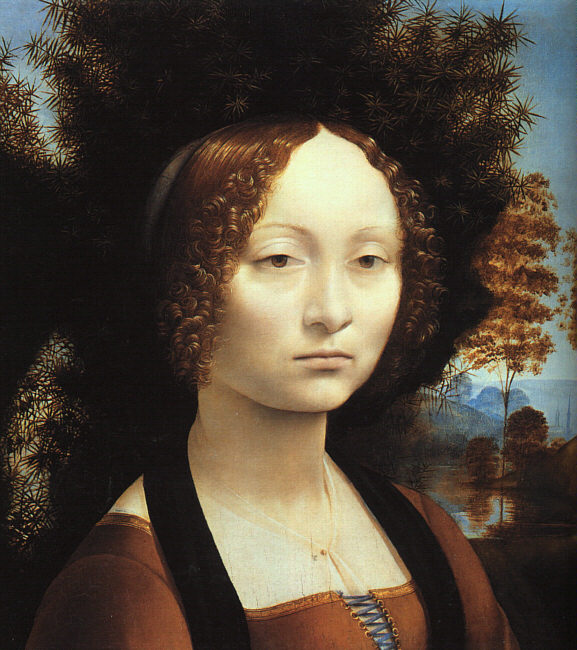

One
of Da Vinci's earlier works completed while he was apprenticed to Andrea
Verrocchio in his Floentine workshop. Here, Leonardo learned a variety
of skills that he would master later on in his career. Although this painting
is rather traditional, it includes details such as Ginevra's curling hair
that only Leonardo could
achieve.Although
a portrait of Ginevra de' Benci by Leonardo is mentioned by three sixteenth-century
writers, the attribution of the Washington painting to that artist has
been the cause of much debate. It is now accepted by virtually all Leonardo
scholars. The date of the portrait, generally given as c. 1474, and its
commission,
however,
are still discussed. The sitter, born into a wealthy Florentine family,
was married to Luigi Niccolini in 1474 at the age of sixteen. It was a
customary practice to have a likeness painted on just such an occassion.
Recently, however, the humanist Bernardo Bembo has been identified as a
possible patron. He was the
Venetian
Ambassador to Florence from 1474--76 and again in 1478--80, dates that
have been suggested for the portrait. Bembo and Ginevra, both married to
others, were known to have had a platonic affair, an accepted convention
at the time. The heraldic motif on the painted porphyry reverse side of
the portrait, with
the
motto "Beauty adorns Virtue," praises her, and juniper plants symbolize
chastity, considered an appropriate choice for a marriage portrait. The
juniper bush, ginepro in Italian, is also a pun on her name.
Leonardo
has painted a sensitive and finely modeled image of Ginevra. The undulating
curls of her hair are set against her pale flesh, the surface of the paint
smoothed by the artist's own hands. Leonardo's portrait was cut down at
the bottom sometime in the past by as much as one-third. Presumably the
lower section would have
shown
her hands, possibly folded or crossed, resting in her lap.